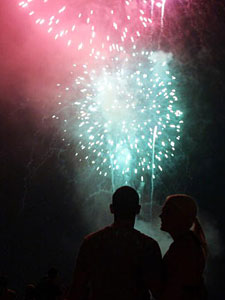|
Photos
Your Voice
|
Some city fireworks fall victim to budget cuts
July 2, 2004
 |
| Some Minnesota cities have cut fireworks displays because of state budget cuts. (Photo by Joe Raedle/Getty Images) |
St. Paul, Minn. — If you're in downtown St. Paul on the Fourth of July, you can catch the big fireworks show at the Taste of Minnesota. But if you're in Fergus Falls, your fireworks experience may be limited to the snakes or sparklers that are now legal in Minnesota.
For the second year in a row, the city of Fergus Falls is not paying for fireworks. Mayor Russell Anderson said the annual show was a longtime tradition in the city, but at a cost of $20,000, it fell into the category of nice-but-not-necessary.
"The majority of the people just looked at it as an issue of plain common sense, you know," Anderson said. "Because $20,000 is a lot of money if you're going to take it away from someone."
Anderson says the choice was between cutting fireworks and cutting a full-time city position. The city's budget crunch stems from the 2003 Legislature's decision to cut local government aid, which affected some cities more than others. Fergus Falls' aid was cut by more than 40 percent. City administrator Mark Sievert said the city lost about $600,000 in 2003. He says the fireworks display was the first of many things the city cut.
"We cut back on skating rinks, a lot on our maintenance and our beautification programs," Sievert said. "We had a lot of staff positions, I think it was about the equivalent of 17 full-time positions that got cut out. Most of them were through not rehiring retirees, but also cutting back on an awful lot of part-time areas."
Sievert said the city is also raising 2004 property taxes by an average of 14 percent. He said there weren't as many complaints about cutting fireworks as city officials had predicted. He said most people understood the city's predicament.
A couple other Minnesota cities made the same decision as Fergus Falls. But when the cities of Worthington and Virginia decided they could no longer afford fireworks on the Fourth of July, the business community stepped in and raised money to fund the annual displays. Virginia city finance director Ronald Lackner said the city lost more than $1 million in state aid in 2003. He says city officials had to decide what services were essential.
"It's one of those things that you don't want to cut, but they've already cut the fire and the police departments as far as they can cut them, we're short staffed in a lot of other areas, and so this was an item cut," Lackner said. "They cut the city clean-up, they cut the student help for beautifying the city."
Virginia and other cities on the Iron Range have been particularly hard hit by state budget cuts, because they get money from the taconite tax. That money now counts toward their local government aid. Lackner said Virginia will have to make deeper cuts next year, or consider raising taxes.
The budget situation is much brighter in many Twin Cities suburbs, which didn't get much local government aid to begin with. More than two dozen metro-area communities hold fireworks displays. The city of Chanhassen spends more than $20,000 on a display it bills as one of the best in the Twin Cities, and the city of Eagan spends more than $30,000 on its show. The city of Lakeville decided to cut its annual fireworks display this year, but local businesses raised money so the show will go on.
|
News Headlines
|
Related Subjects
|
